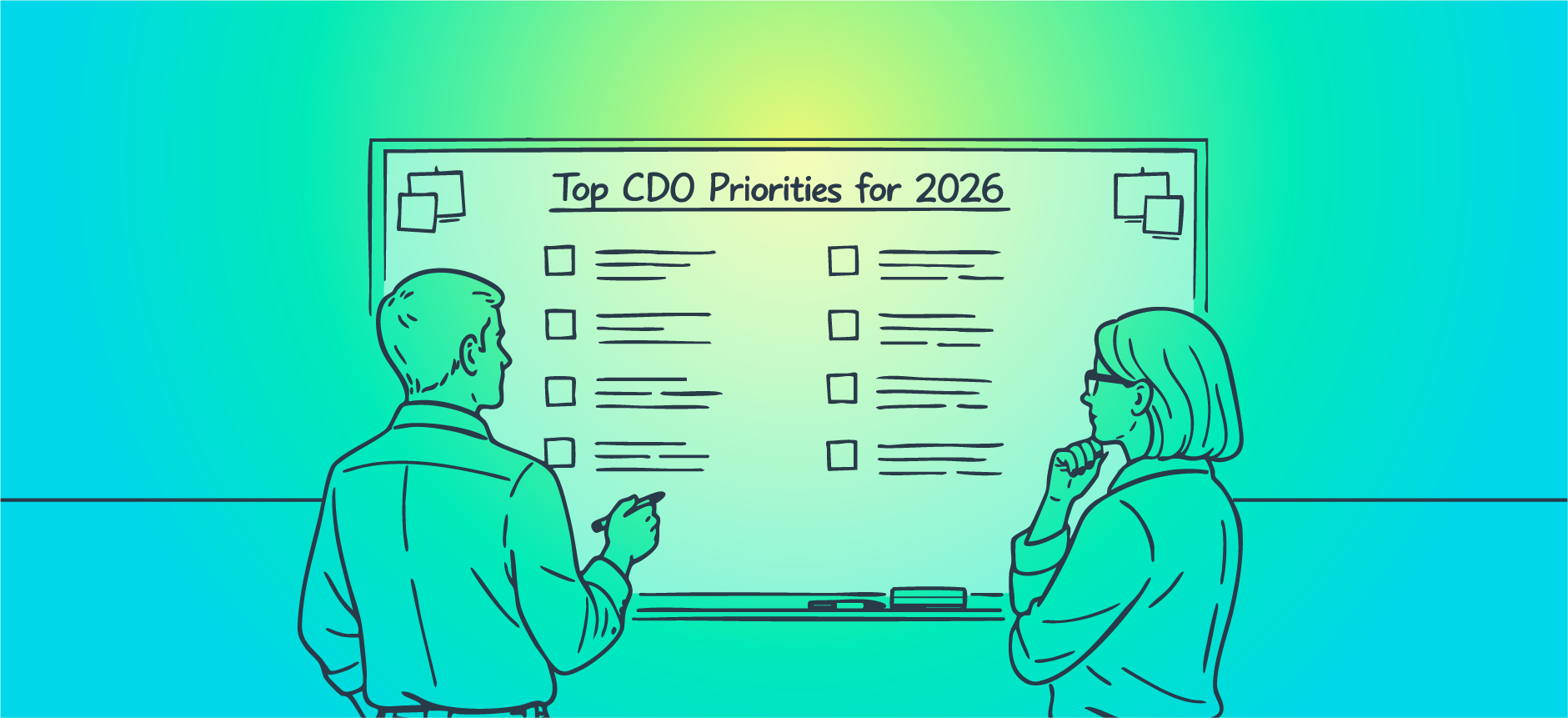CDOs in the Age of AI: Adapting Strategies and Embracing Opportunities

Summary:
- Generative AI (GenAI) is transforming daily lives and business operations.
- Data quality remains a persistent challenge for organizations looking to harness the power of AI.
- CDOs stress the importance of improving data quality and aligning data strategy with business strategy.
- Organizations should avoid blindly trusting AI and instead focus on using AI to inform and accelerate work.
- CDOs play a critical role in promoting ethical guidelines and principled practices for responsible AI use within organizations.
Generative AI (GenAI) represents one of the most transformative technology developments in recent years - and it's taking the world by storm. Over the past year, GenAI has quickly become an integral part of our daily lives and business operations. From enhancing customer experiences to streamlining processes and driving innovative solutions, AI's influence is not only pervasive, but also growing at an unprecedented rate.
At the recent MIT CDOIQ event, CDOs and data leaders could not stop talking about the impact AI is having on their organizations. But despite the hype, many CDOs are grappling with how to implement AI in a way that ensures its use is ethical, transparent, and trustworthy.
Generative AI Takes Center Stage
According to Wavestone's 2024 Data and AI Leadership Executive Survey, more than 60% of participants believe that GenAI has the potential to be the most transformational technology in a generation. That's a bold statement, but one that certainly rings true with many data leaders. The survey goes on to state that 62.3% of participants view Generative AI as a top organizational priority.
However, as organizations across industries look to harness the power of AI, one stubborn problem remains: data quality. According to Wavestone, data quality is a persistent challenge for more than 60% of respondents. And when data quality is bad, so, too, are the insights generated by AI.
In the MIT CDOIQ session entitled Fifteen Years since its Creation: What Comes Next for the CDO/CDAO Role in an AI Future?, a panel of CDOs from Capital One, Northeastern University's Institute for Experiential AI, T-Mobile, and 84.51 all stressed the importance of improving data quality, underscoring that accurate, trustworthy data is "so critical" to the successful adoption of AI. After all, if the data isn't right, organizations have no hope of generating the kind of insights needed to transform the business.
The panel went on to discuss how "AI raises the stakes" when it comes to data quality and using data for strategic advantage. Not only is there more data than ever before, but the quality and integrity of the data must be even higher than in the past in order to avoid bias and mitigate risk.
To build ethical, trustworthy AI, you must have clean data. But improving data quality business-wide is easier said than done.
To overcome the data quality challenge, the CDO panel advised CDOs to put the tools in the hands of domain experts. Let them see, firsthand, just how bad the data really is. Hopefully, this insight will fuel support and investment in improving data quality.
Data Strategy Follows Business Strategy
The CDO panel also encouraged data leaders to develop a data strategy that follows the business strategy. After all, without a codified business strategy, data strategy implementation will suffer. They reinforced the importance of taking a company-wide approach to data management and leveraging data infrastructure to solve business problems.
The panel also discussed the role of the CDO as it relates to risk management. While many organizations today are risk averse, the panel highlighted that without risk there is no reward. The role of the CDO is to manage risk and translate it into what's acceptable for the organization. By raising awareness, CDOs can mitigate concerns and determine the level of risk that is acceptable within their organization.
Avoid "Falling Asleep at the Wheel"
As AI becomes more sophisticated, and the workforce becomes increasingly more analytic and data-aware, there is a temptation to put greater trust in AI technologies and the insights they provide. However, as one CDO stated, "trusting AI is like falling asleep at the wheel."
Instead, organizations should focus on using AI models to accelerate and inform their work - not replace it. Keeping humans in-the-loop is one of the biggest risk mitigators, as is anchoring AI on principles, not ideologies. By embracing fundamental, universally accepted values and ethical standards rather than rigid, dogmatic systems of belief, organizations can mitigate risks that arise as they implement AI technologies.
Words of Wisdom for CDOs in the Age of AI
The role of the CDO continues to evolve. In 2012, only 12% of organizations had an appointed CDO or CDAO. Today, over 83% of organizations have a CDO or CDAO in place, with 51% stating the role is successful and established.
With 90% of organizations anticipating an increase in their investment in GenAI, the role of the CDO has never been more critical. AI is poised to have a huge impact on the knowledge economy, making the role of the CDO more important than ever before. As issues such as bias and discrimination surface, CDOs will be called on to lead the charge when it comes to the responsible, ethical use of AI within their organizations.
When asked for words of advice for CDOs or aspiring CDOs, the panel offered four pieces of advice:
- Use the tools yourself: make sure you experience how the tools work - and encourage executives to use them too. Tools are powerful, but it's important to demonstrate the art of the possible.
- Hire people with learning agility: while technical skills are critical, don't overlook the importance of curiosity and learning agility when it comes to looking for talent.
- Spend time in the business: understanding business challenges is key to developing a data strategy that addresses business problems. By immersing yourself in the business, you can uncover new ideas and ways to implement solutions that address true business needs.
- Keep ethics and principles in mind: AI opens the door to risk. And it's the CDOs role to promote ethical guidelines and principled practices to ensure that organization is using AI technologies responsibly.
The role of the CDO has never been more critical. By adapting new strategies, embracing new opportunities, and mitigating risks, they hold the power to transform how their organization uses data to drive business impact.
For more insights from leading CDOs and data leaders, please explore our Data Masters Podcast.
Get a free, no-obligation 30-minute demo of Tamr.
Discover how our AI-native MDM solution can help you master your data with ease!




